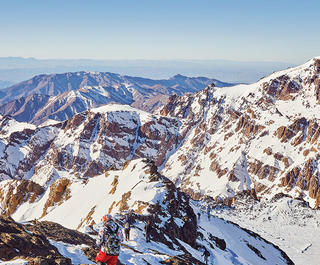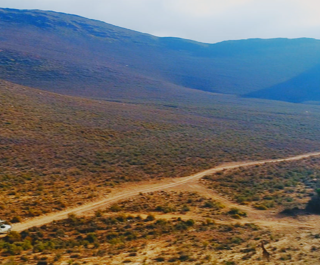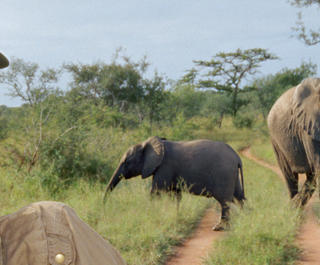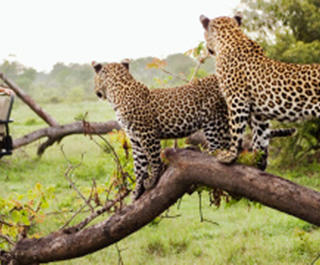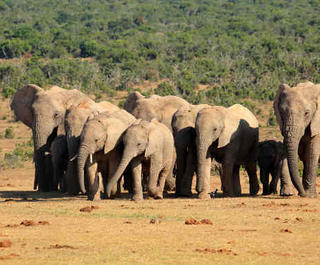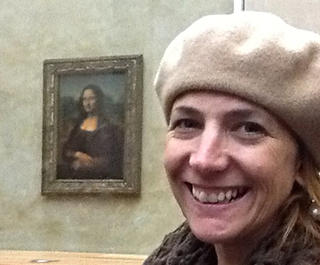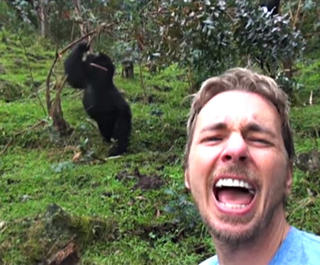
It's an hour before dawn in the Klein Karoo – a semi-desert, Outback-like region in South Africa's Western Cape, about 50km inland from the Garden Route – and the silhouette of a tall, slim figure in a wide-brimmed hat edges towards my parked car.
Despite half-fearing that I'm in a South African version of Wolf Creek (that terrifying 2005 Australian horror flick), I nevertheless wind down the window and am relieved to discover that the stranger is, in fact, Devey Glinister.
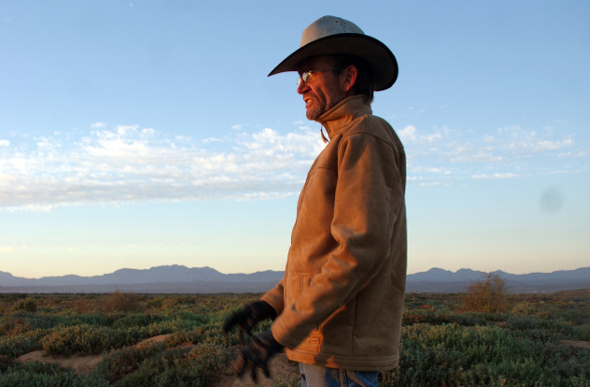 Tour guide Devey Glinister looms large on the Klein Karoo
Tour guide Devey Glinister looms large on the Klein Karoo
"Morning," he says, his gruff, Afrikaans-tinged English piercing the silent, bone-chilling air. "We'll set off in a coupla minutes. Just waiting for a few more people to arrive."
Devey, I've been reliably informed, is definitely more 'Crocodile' Mick Dundee than 'Mad' Mick Taylor (Wolf Creek's serial-killing antagonist). A well-known Karoo character and passionate wildlife conservationist, Devey is fondly dubbed the 'Meerkat Man'. Each morning, he leads tourists into the curious world of these absurdly cute-looking African mongooses, who have starred in David Attenborough documentaries, quirky TV adverts, and The Lion King (remember Timon?).
Hopping in his bakkie (a Ute-like truck), Devey leads the convoy of cars that have gathered in this lay-by outside Oudtshoorn, a town famed for its 'ostrich tourism'. Show farms allow visitors to meet, feed, ride and dine on these flightless birds – the cousin of Australia's emus – but as intrigued as I was by them, it was the chance to see meerkats, close-up, in their natural habitats, that really lured me here.
Take a detour through South Africa's Garden Route
Track more of Africa's amazing wildlife and maybe take a cheetah for a walk
Meerkatville
It's still dark when we arrive at 'Meerkatville'. Officially known as the De Zeekoe farm, it hides, over 8000 hectares, an elaborate, centuries-old burrow system that provides shelter to meerkats and other wild animals and creepy crawlies.
My fellow meerkat observers and I shiver as we get out of our vehicles. While temperatures in the Klein Karoo occasionally hit 55C, they can also sink well below zero. Thankfully, it's not that icy today, and we warm up as Devey and his two twenty-something assistants whip out a Thermos flask and fortify us with mugs of tea (or instant coffee) and beskuits (wheatmeal rusks).
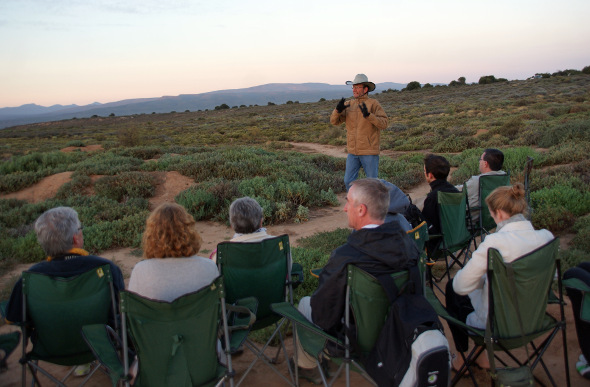 Tourists wait patiently to catch a glimpse of the meerkat family as dawn breaks
Tourists wait patiently to catch a glimpse of the meerkat family as dawn breaks
"Meerkats hate the cold," says Devey, as the sun inches above the horizon and begins to paint the big sky blood-red. "They don't get out of bed until the sun has risen. They're more sensible than some."
Amid a chorus of birdsong, Devey takes us out on to a vast, scrubby field, each of us carrying a camper's bag chair. He tells us to park them in a semi-circle, around a chain of light brown mounds, clustered with parched vegetation.
"Each evening," says Devey, "one of us comes out to see where this particular troop of meerkats go to bed. Because this is where they'll wake up."
Patience comes to those ...
For the next half-hour, we sit and wait. And wait. As the sun soars, so do the heat and anticipation. I detect a sliver of impatience in the air. Frustration, perhaps. Fear even; maybe the meerkats won't turn up.
Devey, however, keeps us entertained with fascinating snippets and shocking anecdotes about these furry critters. They're definitely not as cute as they look.
In fact, as Devey stands and waxes lyrical like a charismatic stage thespian, it appears there's something rather mafia-like about meerkats, whose mobs comprise a dominant male and a dominant female and can grow up to 30-strong. There are 12 families in this 10km radius, says Devey, but they don't tend to socialise.
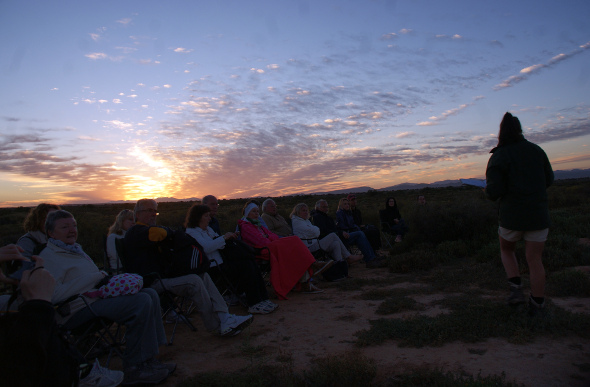 Devey holds forth on the unlikely habits of meerkats
Devey holds forth on the unlikely habits of meerkats
"Meerkats are incredibly territorial," he explains. "They like to mark their territory with their scent, and each group has its own unique scent. And if you don't smell right, you're in trouble. They'll attack – and kill – intruders."
Meerkats rely more on their sense of smell than on their comparatively poor sight. "They don't have a sentimental memory, so if a family member disappears, then later returns with a different scent, it's very difficult for them to be reintegrated into the family. They're usually evicted. Sometimes they're killed."
After relating a few more brutal tales of internecine mob warfare, including ones of alpha females killing the offspring of subservient females, Devey pauses, glances down and says: "Ah, here we go."
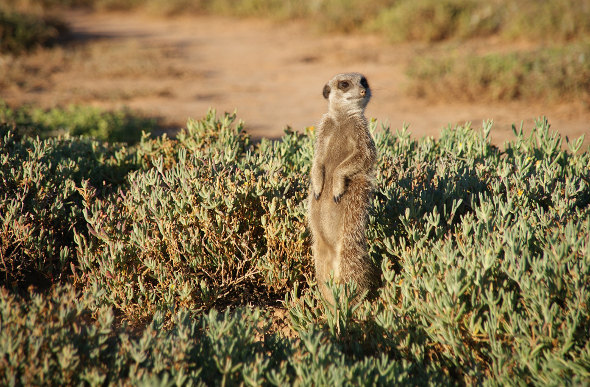 The sentinel cautiously pokes its head out to scan for predators
The sentinel cautiously pokes its head out to scan for predators
The pay-off
A meerkat pokes its head above a burrow, tentatively emerging – all 30 centimetres and 600 grams of it – to scour the landscape with short, sharp, alert glances.
"It's the sentinel," whispers Devey. "He's looking for predators."
Think: buzzards, eagles and snakes, notably Cape Cobras.
Resting on its hind legs, the meerkat basks in the sunshine. "He's absorbing heat in his solar panel," says Devey, almost Attenborough-esquely. "Meerkats don't have much fat, so they rely on the sun to get their metabolisms going; a bit like reptiles."
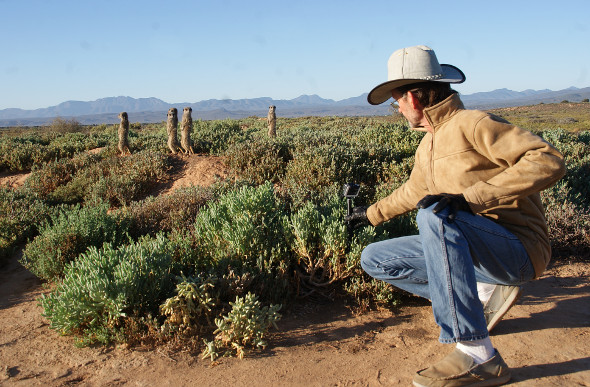 Devey does his best David Attenborough impersonation as the meerkats emerge
Devey does his best David Attenborough impersonation as the meerkats emerge
Camera clicks abound, but we keep as still as possible. Devey had already warned us that meerkats are sensitive to movement. "If you stay reasonably still, the meerkats will treat you as part of the vegetation. If you move, you're a big threat, and they'll disappear underground."
One at a time, amid faint chirrups, more meerkats appear. Soon enough, 10 are standing in a curved line, little paws by their sides, soaking up the sun's rays. Despite the gruesome stories Devey has told us, they look wonderfully cuddly. Judging by the "aahs", I suspect some tourists would like to adopt them.
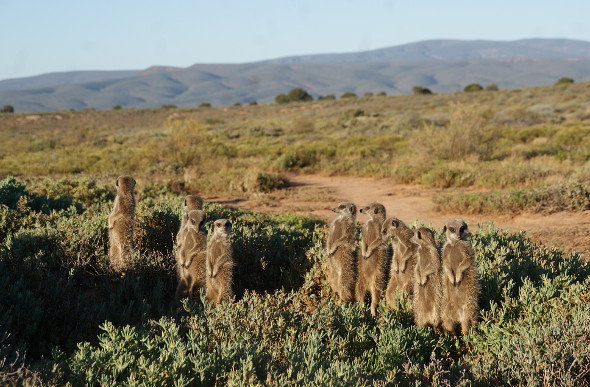 The cuddly-looking meerkat family gather as a group before heading off to do their chores
The cuddly-looking meerkat family gather as a group before heading off to do their chores
But Devey says: "Meerkats make the worst pets. I've heard from people who've had their houses wrecked by them; their leather sofas ripped up and carpets splashed in urine. Meerkats are wild animals and we should respect that."
After 20 minutes of toasting in the sun, the meerkats start to disperse. Some are tussling. Others are burrowing. A few vanish back into the subterranean hovels.
"Each day, the young meerkats arrange a pecking order and do their chores. Some will do the housekeeping, tidying up. Others will forage for breakfast. Some males will rove and try to search for a mate."
I ask Devey about their diet. "Meerkats are a bit like the Chinese," he replies. "They'll eat anything: bugs, spiders, bird's eggs, centipedes, small snakes ..."
Suitably warmed up, and feeling peckish ourselves, we leave the meerkats to it. Travellers may flock to Africa to see the 'Big Five', but sometimes it's the smaller animals that really stick in the memory.


